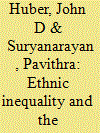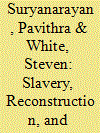| Srl | Item |
| 1 |
ID:
146463


|
|
|
|
|
| Contents |
Why does ethnicity become a salient element of electoral politics in some places but not others? The authors argue that in majoritarian systems, ethnic identity is most salient to electoral behavior when there are high levels of inequality between ethnic groups. Theytest this argument in the Indian states and find that state-level party system ethnification is strongly correlated with economic inequality between groups, a pattern they also find in cross-national data. Theyalso show that in India, when income differences between groups increase, the groups tend to support different parties. The analysis reveals a strong class component to ethnic politics in India, underscoring the possibility that what scholars often view as identity politics can have an element of class politics in disguise.
|
|
|
|
|
|
|
|
|
|
|
|
|
|
|
|
| 2 |
ID:
142597


|
|
|
|
|
| Summary/Abstract |
Tracing activity in 15 Indian state assemblies from 1967 to 2007, we find that overall legislative activity declined but there was also considerable variation across states. States with large electoral constituencies and politically fragmented assemblies showed the worst performance, which suggests a link between political fragmentation and institutional performance.
|
|
|
|
|
|
|
|
|
|
|
|
|
|
|
|
| 3 |
ID:
178999


|
|
|
|
|
| Summary/Abstract |
Conventional political economy models predict taxation will increase after franchise expansion to low-income voters. Yet, contrary to expectations, in ranked societies—where social status is a cleavage—elites can instead build cross-class coalitions to undertake a strategy of bureaucratic weakening to limit future redistributive taxation. We study a case where status hierarchies were particularly extreme: the post-Civil War American South. During Reconstruction, under federal oversight, per capita taxation was higher in counties where slavery had been more extensive before the war, as predicted by standard theoretical models. After Reconstruction ended, however, taxes fell and bureaucratic capacity was weaker where slavery had been widespread. Moreover, higher intrawhite economic inequality was associated with lower taxes and weaker capacity after Reconstruction in formerly high-slavery counties. These findings on the interaction between intrawhite economic inequality and pre-War slavery suggest that elites built cross-class coalitions against taxation where whites sought to protect their racial status.
|
|
|
|
|
|
|
|
|
|
|
|
|
|
|
|